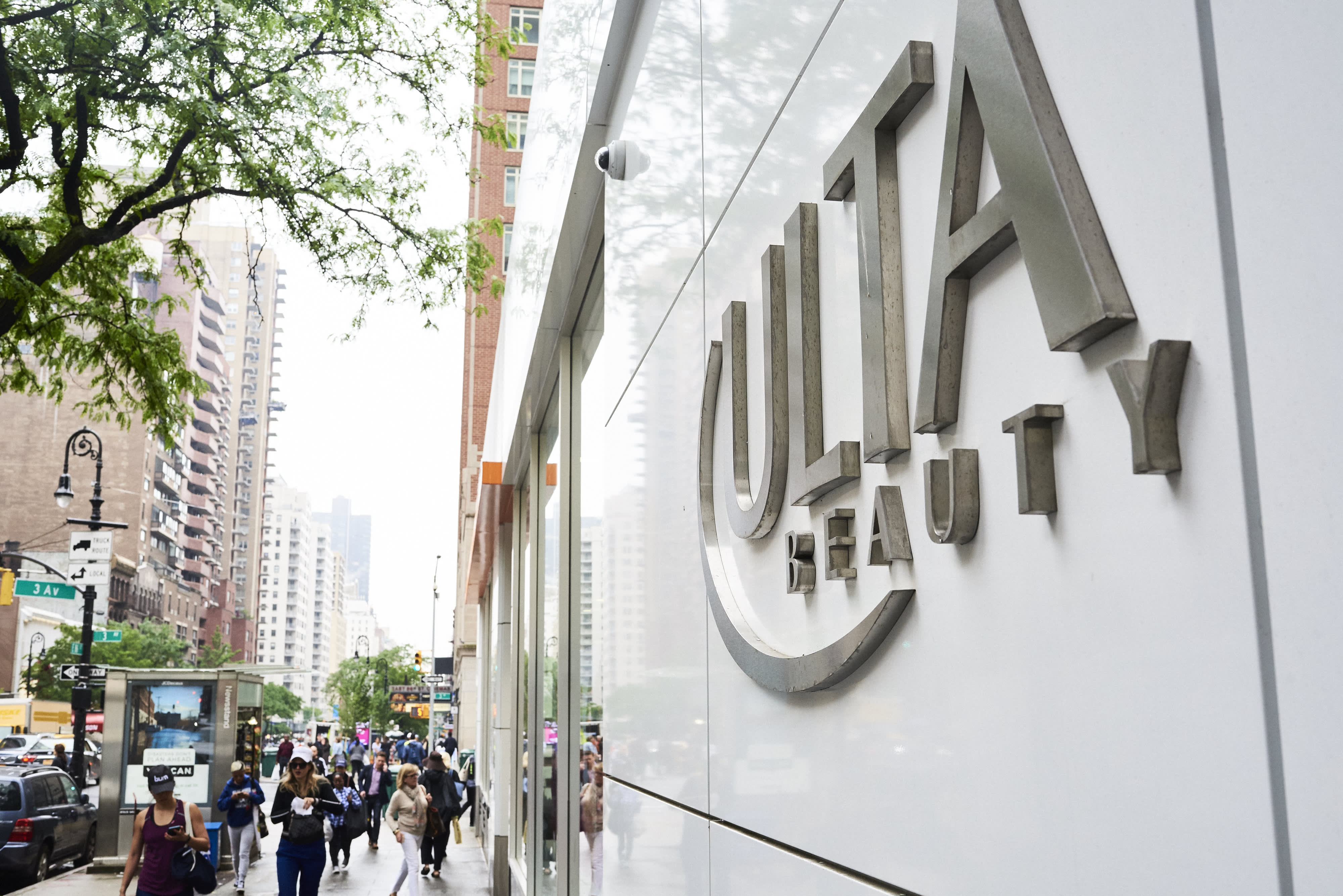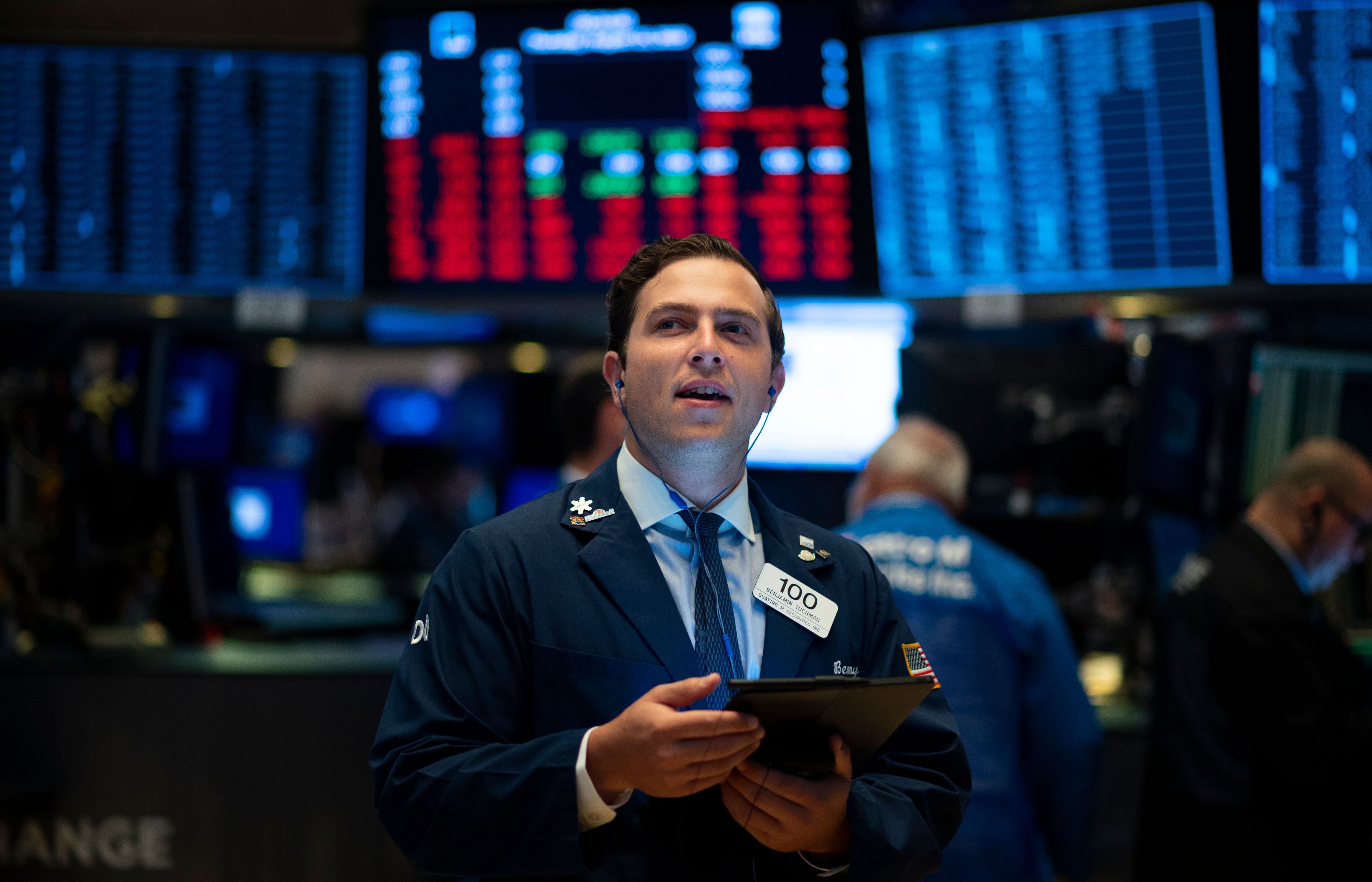
Pedestrians pass in front of an Ulta Beauty store in New York.
Gabby Jones | Bloomberg | Getty Images
In the beauty business, there's been a changing of the guard over the past decade.
Social media has bolstered the success of specialty stores and cultivated a number of billion-dollar upstart beauty brands that are going head-to-head with well-established players like Estee Lauder. As retailers like Ulta Beauty and Sephora have won over shoppers, the former anchor of the cosmetics industry — the department store — has faltered.
"Beauty seems to be following the same general trend from retail a few years ago," said Vic Drabicky, founder of January Digital, a marketing consultancy that works with popular cosmetic lines like NARS and Rihanna's Fenty Beauty.
"When you can show people, it's more than just a transaction, and add-in experience and expertise, you end up in a good spot."
Since 2009, U.S. beauty and personal care sales have risen 52%, according to market research company Euromonitor. The global cosmetics industry is projected to hit $430 billion by 2022, according to a report by Allied Market Research.
Specialty stores shine
Ulta Beauty has been a clear standout over the past decade with its stock up more than 1,250% since 2009, nearly seven times the gains of the broader market. The retailer now has a market cap of $14.4 billion as of the market's close on Dec. 26.
Over its 30 years in business, Ulta's strength has been its focus on being an all-in-one destination. It offers in-store salon services as well as products ranging from drugstore lines like Maybelline and L'Oreal to pricier prestige brands like Urban Decay and Benefit.
Ulta has also bucked a broader slowdown among retailers with its in-store sales up more than 413% since 2009. And, while other retailers are closing stores, it opened 67 locations in the first 10 months of the year, according to FactSet. The company, which wasn't immediately available to comment, had previously announced plans to open 80 stores by year-end.
"Beauty specialists have gained share at the expense of department stores over the last decade," Fatima Linares, senior research manager at Euromonitor, said in an interview. "While specialist retail sales grew by almost 6 percentage points from 2009 to 2018, department stores saw their shares stagnate in the same period."
The entrance to Sephora at The Shoppes at Marina Bay Sands.
Jeff Greenberg | Getty Images
Ulta's appeal has been helped by its celebrity brands, such as an exclusive in-store distribution deal for the Kylie Cosmetics line last November and its relationship with YouTube star James Charles. These relationships help drive traffic to the store. However, a pullback in the key color cosmetics category, which includes lipsticks and eye shadows, has weighed on the stock recently. Ulta's shares are up around 3% this year, despite seeing a 42% surge in the first quarter of 2019.
"This has happened before, and therefore it is expected that color cosmetics will recover at some point, but it looks like this time, the recovery will take longer," said Linares. "The trend this time is driven by consumers looking for a more natural and healthier options and, in consequence, opting for a more natural look."
However, rival beauty specialist Sephora, owned by french luxury brand LVMH, has already made efforts to cater to the shift in trends.
"The past decade has been a time of significant growth and change for the beauty industry," Artemis Patrick, Sephora's chief merchandising officer, said. "For example, growing demand for ingredient transparency inspired us to launch Clean at Sephora, which helps clients to better navigate the growing category of clean beauty."
For the educated consumer, health and wellness have now become a top priority. Within the beauty industry, this has been most evident in the growing popularity of self-care products like face masks and moisturizers, which has helped drive sales of skin-care products up 48% over the past decade, according to Euromonitor.
"The number of consumers who are making purchase decisions primarily based on the price of a product is decreasing," Larissa Jensen, executive director, and beauty industry analyst at NPD, said in an August report. "The significance of knowing exactly what they are putting on their skin becomes more important."
For some consumers, this means steering clear of items that contain microplastics and favoring items that include natural and organic ingredients.
The specialty retailers also have been quick to take advantage of emerging technology to help drive customers to their stories.
According to a survey by WSL Strategic Retail that was presented at the Connected Consumer Conference in November, 57% of female shoppers use mobile devices to help them shop in-store. However, 43% are often choosing between two to three stores when making cosmetic purchases.
To lure these customers in, Sephora has adopted an ad technology by Google that reveals local store promotions and inventory on shoppers' phones as they walk near a store. While LVMH does not break out Sephora's individual numbers, Google said the retailer saw a noticeable increase in in-store sales and a higher return on advertising spending from these promotions.
Department stores makeover
It's been an uphill battle for department stores. Not only have the specialty stores wooed their customers, but the rise of e-commerce has weakened foot traffic through their stores. Consumers are looking for the quickest and most efficient way to shop, and increasingly online options win out.
Since 2013 beauty and personal-care sales at department stores have increased by around 6%, while online sales in the same category are up more than 150%, according to Euromonitor.
Amazon is seeing a benefit from this shift. In June, it launched its first professional beauty store, offering products reserved for licensed stylists and makeup artists through its Amazon business accounts.
The following month, Amazon teamed up with pop star Lady Gaga as the sole retail distributor of her first cosmetics line, Haus Laboratories. The partnership appears to be paying off: Haus' Glam Room Palette No. 1 was one of the bestselling beauty products on the website this holiday season.
Meanwhile, departments stores are feeling the pinch. Macy's destination business, which includes beauty categories such as fragrances and cosmetics, makes up 40% of the company's sales.
"We're gaining market share in fragrances but we're not in overall beauty," said Macy's CEO Jeffrey Gennette on an earnings conference call this summer. "We're really holding our own in skin care, but we're not maintaining our share and we're ceding market share in color [cosmetics]."
The retailer declined to comment on recent sales trends, however, it said it is doubling down on its effort to reengage beauty customers. One example is a partnership with Modiface, an augmented reality business that was acquired by L'Oreal in March 2018, that allows shoppers to virtually try on a variety of cosmetics both on an app and in-store.
"Technology and experiential components will continue to be paramount to successful beauty campaigns, launches and displays," Nata Dvir, Macy's general business manager for beauty, said. "Improving the customer experience and creating newness in the category is showing no signs of slowing down."
Nordstrom has also revamped its strategy by dedicating two floors to beauty in its new Manhattan flagship store, including millennial favorites such as hair-styling service DryBar and an Anastasia Beverly Hills Brow Studio.
The redesign also features digital experiences such as an interactive fragrance finder that allows customers to use a touch screen to try out new fragrances. A personality quiz directs you to a scent you might like, then you can opt to have the machine spray a sample.
Kylie Jenner visits Houston Ulta Beauty to promote the exclusive launch of Kylie Cosmetics with the beauty retailer, on November 18, 2018 in Houston, Texas.
Rick Kern | Getty Images
"We don't think of our business in separate channels but give a holistic experience both online and in store, connecting the digital and physical," said Gemma Lionello, executive vice president and general merchandise manager for accessories and beauty at Nordstrom.
Their launch of new initiatives to draw in customers has yet to turn the tide on stock performance. As of Thursday's market close, Nordstrom shares, which have a market value of $6.4 billion, have fallen about 12% this year. Kohl's has a market value of about $8 billion and is down about 23% this year, while Macy's has seen its stock tumble a whopping 44% in 2019. Macy's loss, which has cut its market value to $5.1 billion, has also pushed it to the bottom of the S&P 500 this year.
The rise of the influencer
Social media has also brought its own massive change to the industry. It created a digital subgroup of celebrity with enormous reach, millions of fans and — most importantly — the power to make or break a brand.
One platform that's been critical to the rise of the influencer is Facebook's Instagram. Of the social network's more than a billion user accounts, some 500,000 are made up of active influencer accounts. Companies spend anywhere from $100 to thousands of dollars for beauty gurus to make a single product post on their page.
"The rise of Instagram has really propelled the effect that social media has had and just, in general, the space has grown rapidly," said Tribe Dynamics co-founder Conor Begley. Tribe, an influencer software data company, calculates the monetary revenue of influencer-sponsored content.
Bonita Hein | Getty Images
Tribe uses a metric called "earned media value" to calculate how much individual and combined influencer engagement with followers, and other users, is worth when promoting products and services across social media platforms such as Instagram, YouTube and Twitter.
For example, before its $845 million buyout by Shiseido, prestige skin-care line Drunk Elephant garnered nearly $35 million in total EMV from the start of the 2019 — a more than 100% increase for the brand from the year prior.
"Close to a dozen [beauty] brands have achieved billion-dollar valuation and have done it using really effective marketing that is social-media focused," Begley said.
This coupled with the e-commerce explosion has bred a mega-industry, with online beauty retailing projected to be worth $38 billion by 2023, suggesting a 13% increase from its current value, according to Euromonitor.
Some of the beauty unicorns include cult cosmetic lines such as Glossier and influencer-turned-mogul Huda Kattan's Huda Beauty line. Eighty percent of teens say they now get their beauty tips from influencers, according to a survey of teen spending conducted by Piper Jaffray this fall.
One reason is trust. According to a survey in Edelman's 2019 trust barometer report, 63% of 18- to 34-year-olds trust influencers' opinions of brands more than advertising done by the brand itself. Additionally, the survey revealed that within a six-month time period 58% of those polled admitted to purchasing a new product because of an influencer.
"All of the power went from manufacturers and retailers to the consumers themselves," said Drabicky. "Now we have social media where makeup artists are going on there and showing people exactly what to do."
https://news.google.com/__i/rss/rd/articles/CBMiYmh0dHBzOi8vd3d3LmNuYmMuY29tLzIwMTkvMTIvMjcvaG93LWRlcGFydG1lbnQtc3RvcmVzLWxvc3QtdGhlaXItY2xvdXQtaW4tdGhlLWJlYXV0eS1pbmR1c3RyeS5odG1s0gFmaHR0cHM6Ly93d3cuY25iYy5jb20vYW1wLzIwMTkvMTIvMjcvaG93LWRlcGFydG1lbnQtc3RvcmVzLWxvc3QtdGhlaXItY2xvdXQtaW4tdGhlLWJlYXV0eS1pbmR1c3RyeS5odG1s?oc=5
2019-12-27 13:00:00Z
52780524156891



